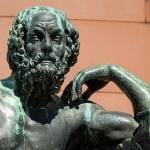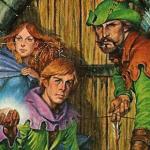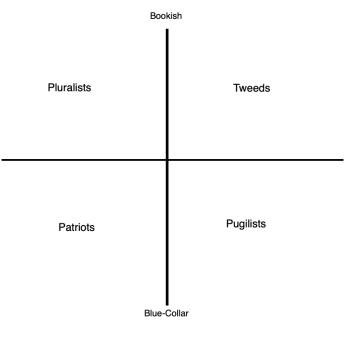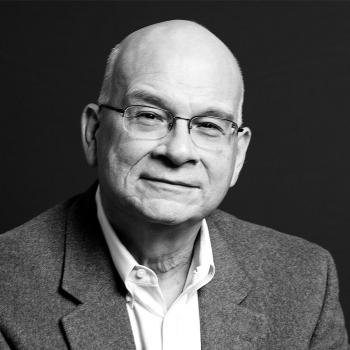
This Independence Day weekend, I dusted off what’s perhaps my favorite video game of all time—2013’s BioShock Infinite—and gave it a spin for the first time in six years. Graphics aside, the game really doesn’t feel like it’s aged very much. In fact, it feels perhaps more timely now than it did upon release.
BioShock Infinite follows private investigator Booker DeWitt on his journey to the floating city of Columbia, a breakaway American state in thrall to a particularly toxic form of nationalism. For one thing, George Washington, Thomas Jefferson, and Benjamin Franklin are revered as divine figures. (One of the game’s most memorable enemies, the “Motorized Patriot,” is a gigantic flag-draped statue of Washington toting a Gatling gun.) For another, under the leadership of the Prophet Zachary Comstock—clearly modeled after Joseph Smith—Columbia is a caste society that has built its World’s Fair aesthetic vision on the backs of a Black, Chinese, and Irish underclass. Enter Daisy Fitzroy, revolutionary leader of the “Vox Populi,” who leads a bloody rebellion hellbent on massacring as many prosperous Columbian citizens as possible.
At bottom, BioShock Infinite is about a struggle between two very different approaches to American public life. The first is a serene, but profoundly racialized, civilization supported by a “peace” bought with the sweat and blood of the downtrodden. The second is an attempt to upend this civilization and turn the tables on the oppressor class, propelled by the retributive logic of the lex talionis. (Upon release, Infinite sparked controversy for its generally negative attitude towards organized religion. Now, I wonder whether its less-than-laudatory attitude toward civil unrest would trigger a different sort of backlash.)
But what’s altogether absent from both paradigms is any principle of forgiveness or reconciliation, of coherent movement toward an understanding of justice that encompasses and dignifies all persons. Comstock’s sterile Columbian aristocracy refuses to see its underclass as fully human; Fitzroy’s revolutionary forces believe that the aristocracy’s sins can only be expiated through blood, even that of Columbia’s innocent children.
How any civilization can hope to endure without such a forgiveness-principle, of course, is a haunting question in its own right. The necessary condition for reconciliation, of course, is the acknowledgement of wrongdoing—which can only occur by reference to some standard of genuine justice transcendent of private will or public custom. But how might that standard be apprehended? Surely, there must be something of the theological here.
BioShock’s creators, no doubt, would think this is largely nonsense. In fact, the BioShock franchise can be read as a series of screeds directed against totalizing philosophical conviction as such. The original title was a haunting deconstruction of Ayn Rand’s profit-centered Objectivism, and its sequel mounted an extended attack on collectivizing communism. But the saga’s attacks on ideology never progress beyond the strictly negative; any positive philosophical-political project that might develop “after the end of belief” never comes clearly into view.
I tend to think this probably reflects the BioShock saga’s creator’s incomprehension of any approach toward reality that exceeds the “immanent frame” of secularity—for, despite all its talk of divinity, Comstock’s Columbia is a fundamentally materialistic cosmos. The only apparent alternative to the franchise’s dystopian visions is the world to which the player returns once they shut off their console—the anomie of late-modern liberal democracy.
I’d go so far as to say that the saga’s a priori exclusion of “God-talk”—of any sense of genuine transcendence or absolute value—leaves its worlds feeling, in some sense, inauthentic. The world many of us inhabit is not “a secular age”: it is, as Gerard Manley Hopkins put it, “charged with the grandeur of God,” where “the dearest freshness deep down things” manifests itself. A nihilism that rejects transcendent justice and purpose, in short, is not ipso facto a sober reckoning with the truth of things; it is itself an ideology by any other name.
I reject this nihilism. And that means that I still believe that, for all its faults and all its turbulent history, the real America is not damned to one of BioShock Infinite’s two grim futures. If the messy progress of American constitutionalism towards “a more perfect Union” stands for anything at all, it stands for the persistent hope of the American people that a unified vision of justice—in the thick, substantive sense of the classical tradition—is still possible, albeit always glimpsed imperfectly.
Perhaps I am wrong about that. Perhaps a few decades from now I’ll be writing this from a different country altogether. After all, my Christian commitments will always come before my national ones. But as yet, I can’t bring myself to believe the American people have lost their capacity for grace and for genuine hope in a real common good. I think we are better, at bottom, than our media—and, all too often, our leaders—wish us to be.












